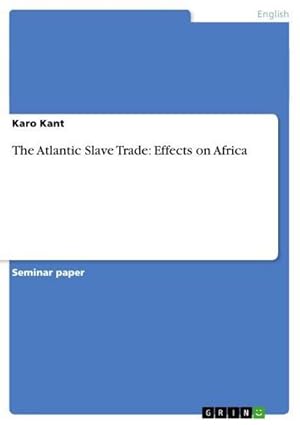kant karo (3 Ergebnisse)
Produktart
- Alle Produktarten
- Bücher (3)
- Magazine & Zeitschriften
- Comics
- Noten
- Kunst, Grafik & Poster
- Fotografien
- Karten
-
Manuskripte &
Papierantiquitäten
Zustand
Einband
- alle Einbände
- Hardcover
- Softcover
Weitere Eigenschaften
- Erstausgabe
- Signiert
- Schutzumschlag (1)
- Angebotsfoto
Gratisversand
Land des Verkäufers
Verkäuferbewertung
-
The Power to Make Choices. Education in "Educating Rita" by Willy Russell
Verlag: GRIN Verlag, 2012
ISBN 10: 365615838XISBN 13: 9783656158387
Anbieter: AHA-BUCH GmbH, Einbeck, Deutschland
Buch
Taschenbuch. Zustand: Neu. Druck auf Anfrage Neuware - Printed after ordering - Seminar paper from the year 2011 in the subject Literature - Basics, grade: 3,0, University of Kassel, course: Literaturwissenschaften - Education and Drama, language: English, abstract: Surrounded by traditions and habits of mind and action, working-class people have never received the chance to realize their potential. The working-class is defined by the relation of the status to manual occupations and limits economic standing as well as cultural ties and shared views (Roberts 3-4). The people's life, therefore, is prefabricated and follows strict traditions and habits. When Roberts says that 'working-class women had learned when young that their place was in the home' and that 'it was accepted by all that the ultimate resposibility for the home was theirs,' (Roberts 125) it becomes obvious that, for example, the women's task is restricted to the kitchen work, the household, and to raising the children. Women know from their childhood that to fulfill these tasks is their destiny and because of missing possibilities and the argument of traditional habits, hardly lots of women and men are trying to escape from these circumstances. Traditions and conventions in this context can also be seen as external influences that restrains individuality. Being a member of the working-class means contribution and passing on a tradition.Furthermore, working-class members feel a certain kind of repletion according to material needs which keeps them from changing the status quo. Status quo should be defined as the situation as it is now, or as it was before (Oxford 1500). Being different from somebody else, i. e. in this case from the community, is not accepted. A person always has to be a member of the group and act like one, whereas individuality is deprecated by the others (Kugler-Euerle 92). Since education is seen as useless and in contrast to the conventions, educated people distinguish themselves from the community as a whole.The following will be focused on the term Education and the implication of escaping from the boundaries of working-class members to achieve independence and individuality. The convictions and the strength to put up with the strain of traditions and conventions will be exemplified through Educating Rita by Willy Russell.
-
The Atlantic Slave Trade: Effects on Africa
Verlag: GRIN Verlag, 2012
ISBN 10: 3656158185ISBN 13: 9783656158189
Anbieter: AHA-BUCH GmbH, Einbeck, Deutschland
Buch
Taschenbuch. Zustand: Neu. Druck auf Anfrage Neuware - Printed after ordering - Seminar paper from the year 2011 in the subject English Language and Literature Studies - Culture and Applied Geography, grade: 2,7, University of Kassel, language: English, abstract: In the sixteenth century, when Europe's interest in Africa moved away from deposits of gold to the need of work force, the Atlantic Slave Trade began. Because of expansion to the New World, Europeans needed reliable workers who were not suffering seriously from diseases and who were used to a tropical climate. After indigenous peopled had proved unreliable and unsuited, African people emerged as excellent workers because they were used to the climate, resistant to tropical diseases, and also hard working on plantations (Boddy-Evans).The Atlantic Slave Trade took place across the Atlantic ocean, from the Western coast of Europe where goods were brought to the Western part of Africa. Slaves were then shipped through the Middle Passage to the New World and were traded with goods, which were brought to Europe. The so-called triangular trade ended in the nineteenth century through the abolition of slavery.Considering the forced migration of African people, the continent suffered great losses. About 13 million people were shipped to the Americas. There are still debates as to how much the continent was, and still is, affected by the trade. Due to the fact that slavery was not new to Africans and the influx of goods, the continent gained material benefits. But the loss of people and, therefore, the loss of work force for the continent itself, prove that Africa still suffers from that period. In particular, continuous poverty and underdevelopment play a major role (Boddy-Evans).The following will be focused on the effects on the economy, society, and people in Africa due to the Atlantic Slave Trade. It will be clarified how Africa changed and how great the effects on African society were and still are today. A working paper on a conference about reparations will be included to illuminate today's extent of the effects.
-
The Power to Make Choices. Education in "Educating Rita" by Willy Russell
Verlag: GRIN Verlag, 2012
ISBN 10: 365615838XISBN 13: 9783656158387
Anbieter: buchversandmimpf2000, Emtmannsberg, BAYE, Deutschland
Buch
Taschenbuch. Zustand: Gebraucht. Gebraucht - Sehr gut - ungelesen,als Mängelexemplar gekennzeichnet, mit leichten Mängeln an Schnitt oder Umschlag durch Lager- oder Transportschaden -Seminar paper from the year 2011 in the subject Literature - Basics, grade: 3,0, University of Kassel, course: Literaturwissenschaften - Education and Drama, language: English, abstract: Surrounded by traditions and habits of mind and action, working-class people have never received the chance to realize their potential. The working-class is defined by the relation of the status to manual occupations and limits economic standing as well as cultural ties and shared views (Roberts 3-4). The people's life, therefore, is prefabricated and follows strict traditions and habits. When Roberts says that 'working-class women had learned when young that their place was in the home' and that 'it was accepted by all that the ultimate resposibility for the home was theirs,' (Roberts 125) it becomes obvious that, for example, the women's task is restricted to the kitchen work, the household, and to raising the children. Women know from their childhood that to fulfill these tasks is their destiny and because of missing possibilities and the argument of traditional habits, hardly lots of women and men are trying to escape from these circumstances. Traditions and conventions in this context can also be seen as external influences that restrains individuality. Being a member of the working-class means contribution and passing on a tradition. Furthermore, working-class members feel a certain kind of repletion according to material needs which keeps them from changing the status quo. Status quo should be defined as the situation as it is now, or as it was before (Oxford 1500). Being different from somebody else, i. e. in this case from the community, is not accepted. A person always has to be a member of the group and act like one, whereas individuality is deprecated by the others (Kugler-Euerle 92). Since education is seen as useless and in contrast to the conventions, educated people distinguish themselves from the community as a whole. The following will be focused on the term Education and the implication of escaping from the boundaries of working-class members to achieve independence and individuality. The convictions and the strength to put up with the strain of traditions and conventions will be exemplified through Educating Rita by Willy Russell. 28 pp. Englisch.




